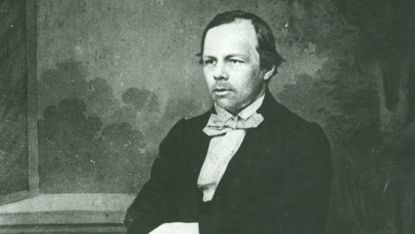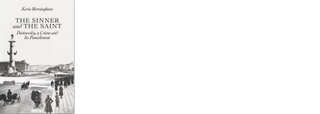Book of the week: The Sinner and the Saint by Kevin Birmingham
Kevin Birmingham explores Fyodor Dostoevsky’s inspiration for Crime and Punishment

In his 2014 debut, The Most Dangerous Book, Kevin Birmingham told the gripping story of how “a drunken night in a Dublin pub” inspired James Joyce to write Ulysses, said Boris Fishman in The New York Times. In his new book, Birmingham “does it again” – this time giving “the Ulysses treatment” to Crime and Punishment.
Birmingham shows how Fyodor Dostoevsky’s 1866 novel – about a double murder committed by a former student named Raskolnikov – was partly inspired by a real-life murderer: the French poet Pierre-François Lacenaire, who in 1834 stabbed to death a convicted thief and his widowed mother. (Later the same day, he attended a comedy show. “That was a great day for me,” he would recall.)
The case became the talk of Paris. Reading about it nearly three decades later, Dostoevsky found Lacenaire to be “enigmatic, frightening and gripping” – and used him as a model for Raskolnikov. Braiding the stories of the two together, Birmingham has written a “magisterially immersive, novelistic account” of how a masterpiece of Russian literature came to be written.
Subscribe to The Week
Escape your echo chamber. Get the facts behind the news, plus analysis from multiple perspectives.

Sign up for The Week's Free Newsletters
From our morning news briefing to a weekly Good News Newsletter, get the best of The Week delivered directly to your inbox.
From our morning news briefing to a weekly Good News Newsletter, get the best of The Week delivered directly to your inbox.
Birmingham’s account also reveals some striking parallels between the lives of Lacenaire and Dostoevsky, said Anna Aslanyan in The Spectator. Both writers were from wealthy backgrounds, but fell into poverty in adulthood. Both were incarcerated for significant periods: Lacenaire’s petty thieving landed him in prison, while Dostoevsky’s youthful radicalism led to a ten-year exile in Siberia. (While there, he met numerous murderers, and recorded his observations in a secret diary.)
Writing The Sinner and the Saint can’t have been easy – the “sheer weight of sources” must have been overwhelming – but Birmingham shifts the “historical layers with seeming ease”. The result is a book that “works on several levels: as a historical study, a work of literary criticism and, gratifyingly, a double thriller”.
Crime and Punishment is often described as a “whydunnit”, said Alex Christofi in The Guardian: Raskolnikov commits his crime near the start of the book, and it’s never entirely clear what drives him to it. But for modern readers, another mystery “hovers behind the novel” – how can we ever account for a work of genius like that, which appears to have “sprung into the world fully formed”?
In exploring how Dostoevsky’s masterpiece came to life, Birmingham goes a long way to answering that question. This is “not just a fitting tribute to one of the great works of literature, but a dazzling literary detective story in its own right”.
Allen Lane 432pp £25; The Week Bookshop £19.99

The Week Bookshop
To order this title or any other book in print, visit theweekbookshop.co.uk, or speak to a bookseller on 020-3176 3835. Opening times: Monday to Saturday 9am-5.30pm and Sunday 10am-4pm.
Create an account with the same email registered to your subscription to unlock access.
Sign up for Today's Best Articles in your inbox
A free daily email with the biggest news stories of the day – and the best features from TheWeek.com
-
 Sarah Langan recommends 6 women-centric horror books
Sarah Langan recommends 6 women-centric horror booksFeature The horror novelist recommends works by Stephen King, Gillian Flynn, and more
By The Week US Published
-
 6 spacious homes for car lovers
6 spacious homes for car loversFeature Featuring a 14-car showroom in Oregon and a Bentley-style apartment in Florida
By The Week Staff Published
-
 6 serene homes in Vermont
6 serene homes in VermontFeatures Featuring a four-level Shaker barn in Hartland and a Scandinavian-inspired home in Stowe
By The Week US Published
-
 Amanda Montell's 6 favorite books that will expand your knowledge
Amanda Montell's 6 favorite books that will expand your knowledgeFeature The linguist recommends works by Mary Roach, Alice Carrière, and more
By The Week US Published
-
 Rowan Beaird recommends 6 compelling books from the 1950s
Rowan Beaird recommends 6 compelling books from the 1950sFeature The author recommends works by Patricia Highsmith, Shirley Jackson, and more
By The Week US Published
-
 6 spacious homes with great rec rooms
6 spacious homes with great rec roomsFeature Featuring a suspended fireplace in Arizona and a marine-themed home in Maine
By The Week Published
-
 Recipe: gnocchi di spinaci (spinach gnocchi)
Recipe: gnocchi di spinaci (spinach gnocchi)The Week Recommends Forget the potatoes for this gnocchi made of the 'classic combination' of spinach and ricotta
By The Week UK Published
-
 Stephen Graham Jones' 6 scary books with deeper meanings
Stephen Graham Jones' 6 scary books with deeper meaningsFeature The best-selling author recommends works by Stephen King, Sara Gran, and more
By The Week US Published


